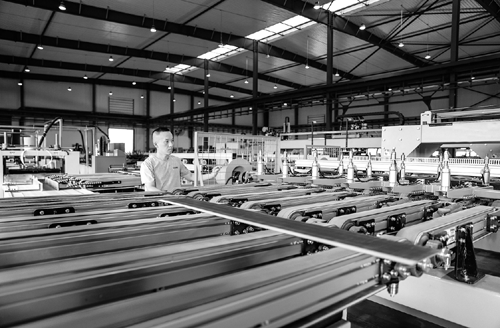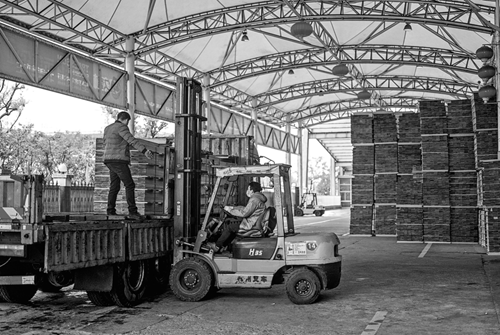Nanxun leads by example in biz transformation
Technology, policy support help district embrace upgrades in its traditional wood industry

At a workshop of Zhejiang Onsense Home Technology Co, there is a complete absence of sawdust and the pungent smell of paint.
This is because the wooden furniture maker from Nanxun district of Huzhou in East China's Zhejiang province has opted for water-based paint for its natural wooden tiles, replacing traditional oil-based ones. Currently, water-based paint tiles form around 95 percent of the company's product portfolio.
"We have opted for water-based paint for our wood tiles due to its environmentally friendly attributes, which have increasingly found favor among consumers," said company Chairman Gu Guohua.
Similarly, at a workshop of Nanxun-based Treessun Flooring Co Ltd, it is hard to find any traces of wood dust in its production line.
The company has installed dust collection devices across its entire production line, from wood cutting to slotting and polishing, where collected sawdust is repurposed into biomass fuel, transforming waste into valuable resources and producing energy-efficient as well as eco-friendly wood tiles with high added value, said the company.
The application of green manufacturing technologies and supportive policies are part of Nanxun district's efforts to steadfastly embrace a green paradigm in its traditional wood manufacturing industry.
Nanxun now has one green industrial park, 10 green factories, six green supply chains and 13 green design products of national level, said the district government.
The strategic green upgrade has helped the district carve out a new path for the development of the local wood manufacturing and home furnishing industry.
As the most representative traditional industry in Nanxun, wood manufacturing has evolved over four decades into a pillar industry, with the overall industry value reaching over 11.3 billion yuan ($1.57 billion) in 2023 and 15 local enterprises exceeding 100 million yuan in annual output value, according to the latest data from Nanxun's development and reform bureau.
Nanxun, known as the "Capital of Wood Tiles", took to the path of manufacturing tiles made of natural wood in the late 1980s. It now accounts for about 65 percent of the country's production of natural wood tiles and has emerged as China's largest wood tile base, characterized by highly concentrated brand clusters, a complete industrial chain and significant industry influence.
During the past few years, with consumers increasingly prioritizing quality of life and shifting market dynamics, over half of Nanxun's tile enterprises have embarked on a transformative journey into the field of home furnishings.
The companies have diversified production to include wooden doors, cabinets, wardrobes, bookshelves and other home decor products, offering consumers a diverse range of choices and one-stop home decoration services.
For example, Furom Carpentry, another Nanxun-based wood enterprise, is targeting the high-end full-house customization market, covering research and development, production, sales and after-sales services.
"We plan to launch self-developed 3D texture carving technology for wooden furniture by the end of this year, which is expected to drive technological breakthroughs for the high-end full-house furnishing sector," said Yao Jianfeng, chairman of the company.
Last year, the output value of Nanxun's full-house furniture sector stood at 2.35 billion yuan, up 10.8 percent year-on-year, according to data from Nanxun's development and reform bureau.
"The full-house furniture sector has stood out as a new growth driver for Nanxun's wood industry despite a challenging real estate sector and sluggish export performance in 2023," said Huang Hua, an official with the bureau.
Vibrant private sector
The market vitality of Nanxun's wood industry also stems from its burgeoning private sector.
"The local economy is pretty much all about the private sector,"Huang said, "Among the over 900 companies above a designated size (20 million yuan in main business revenue) in Nanxun, only two are not privately owned."
As the most vibrant market entity in Huzhou, the private sector currently contributes to over 70 percent of the city's GDP, more than 70 percent of its technological innovation and new product development, over 80 percent of tax revenue and exports, and about 90 percent of employment opportunities, said the municipal government.
Riding on the national policy of boosting the growth of the private economy, Huzhou introduced its own guideline on promoting the private sector in October, encompassing 39 specific initiatives across 10 dimensions.
These measures aim to promote fair market competition, support the expansion of investment fields, intensify efforts to cultivate key economic entities, boost corporate transformation and upgrading, optimize policy support and foster a robust business environment, said the Huzhou municipal government.
The guideline came after China strategically prioritized the private sector as a key driver of economic growth in July, when the Communist Party of China Central Committee and the State Council, or China's Cabinet, jointly issued a guideline on boosting the growth of the private economy.
In December, the annual tone-setting Central Economic Work Conference reiterated that the nation will implement a number of measures to strengthen private enterprises, including better market access, access to factors of production, fair law enforcement, and protection of rights and interests, as well as further promote the internal driving force and innovation vitality of private enterprises.
"For the robust growth of the private economy, it is imperative to create a high-standard business environment, which calls for the establishment of a pragmatic, efficient, and service-oriented government that is committed to reform and innovation," said Huang Jianhui, a member of the think tank committee under the All-China Federation of Industry and Commerce.
Eyeing sustained growth, the national wood hub of Nanxun will further promote the industrial upgrading of its private companies engaged in traditional industries, which have undergone challenges during recent years due to economic downturns, Huang said.
More supportive guidelines are on the way, covering locally specialized sectors such as electric motors and elevators in addition to wood manufacturing, he added.
"The local government will offer the best of its resources, policies and services in unwavering support to attract more design talent and teams to integrate themselves into Nanxun's development," Wen Jianfei, Party head of the district, said previously.
For instance, the district government has been striving to reinforce the brand image of Nanxun wood manufacturing as a whole by actively taking part in global industry events.
At the carpets and floor coverings expo Domotex in Hanover, Germany, in January, seven wood companies from Nanxun reaped substantial rewards.
"We hope to tap into the European market through this exhibition, where we have also gained a better knowledge of cutting-edge products and technologies, broadening our international perspective," said Ni Yuezhong, president of Zhejiang Shiyou Timber Co Ltd.
Previously focused on the domestic market, the company's participation in the expo contributed to increased sales and influence in the global market, with intended orders reaching about $1 million during the event, Ni said.
As physical exhibitions make a comeback, companies are utilizing various events and trade activities to engage with existing clients, forge new connections and expand market presence.
More such activities can be expected to facilitate market expansion and new orders, actively helping local enterprises secure more domestic and international exhibition resources, the district government said.


Today's Top News
- Chinese New Year of the Horse Luncheon held in Muscatine, strengthening China-US friendship
- Year of the Horse carries message of resilience, solidarity, industriousness
- China remains anchor of stability in unsettled world
- Stage beckons, festive spirit resonates overseas
- China predicts over 285 million inter-regional trips on first day of Spring Festival holiday
- China extends visa-free policy to Canada, UK






























